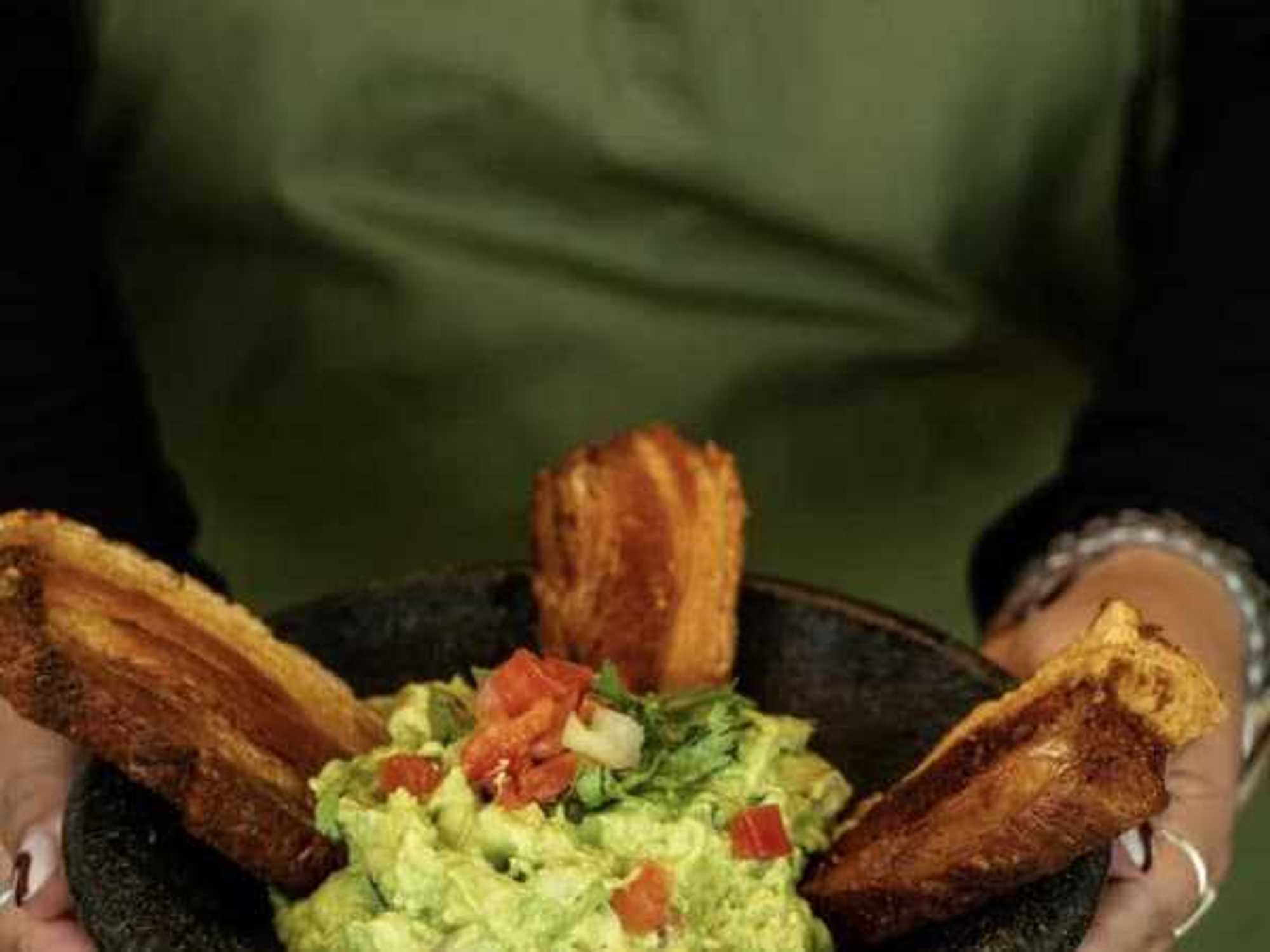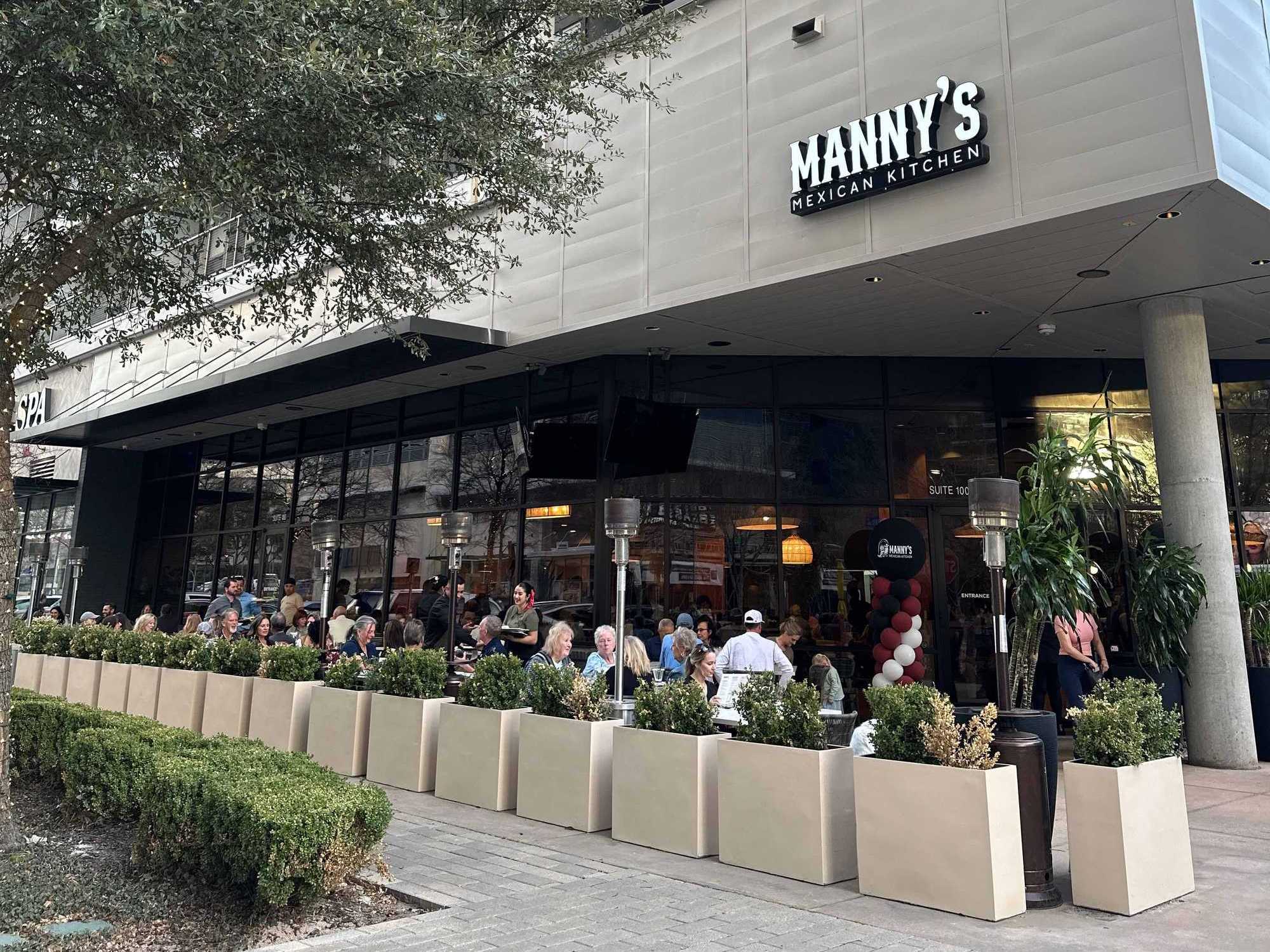Think Outside the Cup
Union coffee shop has grandiose dreams to change the world one cup — and story —at a time
 Union, a new coffee shop near SMU, aims to be a good neighbor by donating 10percent of its revenues to a designated nonprofit.Union/Facebook
Union, a new coffee shop near SMU, aims to be a good neighbor by donating 10percent of its revenues to a designated nonprofit.Union/Facebook Union community curator Mike Baughman.Photo courtesy of Mike Baughman
Union community curator Mike Baughman.Photo courtesy of Mike Baughman Union brews fair trade coffee.Union/Facebook
Union brews fair trade coffee.Union/Facebook Hillary Barnard recently shared her stories from Ghana on the Union Naked Stage.Union/Facebook
Hillary Barnard recently shared her stories from Ghana on the Union Naked Stage.Union/Facebook Impact Foods founder Blaine Iler (right) was a recent speaker on the NakedStage.Photo by Leslie Katz/Urban Photography
Impact Foods founder Blaine Iler (right) was a recent speaker on the NakedStage.Photo by Leslie Katz/Urban Photography
Dallas is in the throes of a coffee renaissance. Independent shops and local roasters are elevating the coffee-drinking experience with their commitment to sourcing the highest-quality beans and best machines.
But Union coffeehouse isn’t bragging about its newly acquired La Marzocco or its skilled baristas. This month-old community gathering spot near SMU has much loftier goals: to be a good neighbor and to inspire action in its customers as well as the business community as a whole.
In addition to selling fair-trade coffee, the coffee shop adopts causes, such as hunger, and raises funds and awareness for a related nonprofit, such as North Texas Food Bank. Union also hosts Friday-night storytelling sessions on its Naked Stage.
“Union is adopting a parish mentality, concerning ourselves with the overall needs of the people in our little niche of Dallas,” says community curator Mike Baughman.
Anyone can get up there and share — or simply listen to their friends and neighbors and revel in the collective experience. During a recent Naked Stage event called Stuffed Stories, for example, the audience heard from social entrepreneurs Chad Houser of Cafe Momentum and Blaine Iler of Impact Foods.
We recently chatted with founder and pastor Mike Baughman, who calls himself “community curator,” to find out more about the Union mission, the Naked Stage and how he hopes to make an impact in Dallas.
CultureMap: Union is clearly not just a coffee shop. Tell us how the idea came about.
Mike Baughman: There’s been a sad shift in much of the church. It used to be that a church sat in the middle of a parish — a geographically defined area or neighborhood — and the congregation, along with its assigned priest, were responsible for the overall well-being of the people who lived and worked in the parish.
At some point in our history, many churches have become concerned primarily with the spiritual well-being of the people who attend worship on a regular basis. The church has, in large part, abdicated its responsibility to be a good neighbor.
Union is an effort to correct that. We are adopting a parish mentality, concerning ourselves with the overall needs of the people who live, work, study, drink and hang out in our little niche of Dallas.
CM: What are your goals for the community? Do they stretch beyond your immediate neighbors — the students at SMU?
MB: We want to be a catalyst that connects the various parts of our community. Rather than executive director or pastor, my title is “community curator.” Like a museum curator who takes works of art and puts them together in a way that strengthens their overall impact, it’s my job to get to know the different pieces of our community — SMU, Art Institute, local businesses, professors, students, hipsters, dorks, churches or what have you — and help connect them in ways that strengthen everyone involved.
My baristas and I are always asking the questions, “What do you need?” and “What can we do for you?” When we are at our best, we are connecting people who can help each other.
“It’s my job to get to know the different pieces of our community and help connect them in ways that strengthen everyone involved,” Baughman says.
Our desire to build robust community is expressed in our storytelling stage, the Naked Stage. Hearing stories, especially naked ones, builds community because it provides a shared experience of storytelling and because it breaks down walls through the vulnerability of the storyteller.
CM: Tell us about how the charity piece works.
MB: We adopt three causes a year and intentionally raise funds, awareness and engagement. The funds piece is easy: 10 percent of all revenue goes to a nonprofit agency under the umbrella cause.
Right now, we’re adopting hunger, with 10 percent of funds going to the North Texas Food Bank (buy a latte, feed someone). In one month, we’ve raised enough money to provide 3,667 meals. At the end of January, we will move on to disaster relief, with 10 percent of all revenue benefiting relief work in the aftermath of Hurricane Sandy.
We raise awareness by incorporating the cause into art on the walls (coming soon), stories on our Naked Stage and special events that educate our customers and staff on the issues surrounding the cause.
We raise engagement by putting together events where people can get their hands dirty making a positive difference. We’re always looking for partners to work with in this area.
“We don’t just want to change our communities and change the way that churches operate; we want to change the way businesses operate,” Baughman says.
For example, we’ve partnered with Ridgewood Park United Methodist Church to put together a food sorting event on January 5. In February, we will partner with Mustang Heroes (a student organization) to put together a special night with speakers, spoken word poetry and hands-on work that will benefit the North Texas Food Bank.
CM: Do you consider yourself a social entrepreneur? Why do you think that way of doing business — in which mission is as fundamental as turning a profit — is important?
MB: I’ve met a lot of people in the past month or two who seem to fit that category, and I think they’re really cool, amazing people. If I can grow up to be like them, that would be pretty amazing.
I think that doing business in this way is critical. [At Union] we don’t just want to change our communities and change the way that churches operate; we want to change the way that businesses operate.
We want to show that generosity can be a verdant part of the business world. We want to demonstrate to businesses both large and small that they can afford to give back more than just a paltry percentage on a small portion of their overall sales.
The business world wields a mighty stick in our global realities. If a company like Starbucks were to make a commitment like we’ve made — to only roast fair trade beans and give back 10 percent of their revenue to charity — it would transform the lives of millions, and not just the lives of those who pick their beans.
“If Starbucks were to make a commitment like we’ve made — to only roast fair trade beans and give back 10 percent of revenue to charity — it would transform the lives of millions.”
A commitment like that from a company like Starbucks would completely transform the coffee industry. We may be tilting at windmills, but I hope that our charitable presence will inspire greater generosity in both large and small businesses both within and outside the coffee business.
CM: Long term, what do you hope will be the impact of Union on Dallas?
MB: We hope that our guests will get involved in meaningful causes, will fall in love with the organizations that address these causes and will stay active after we have moved on to other issues.
We hope to inspire businesses to be more collaborative and generous.
We hope to inspire churches to become better neighbors who are attentive to the needs of the people, organizations and businesses around them.
We hope strengthen a growing movement of people in Dallas who are mobilizing people and businesses to do really good things.
We hope to support cultural and artistic development within Dallas.
We hope to do all of this the best way we know how: outstanding coffee, robust community and essential causes.
Of course, we’ve only been open for a month. It’s easy to be lofty and grandiose in what we want to accomplish. But I don’t know of many organizations who changed the world with mediocre goals.

 Manny's Mexican Kitchen at CityLine.Photo courtesy of CityLine
Manny's Mexican Kitchen at CityLine.Photo courtesy of CityLine